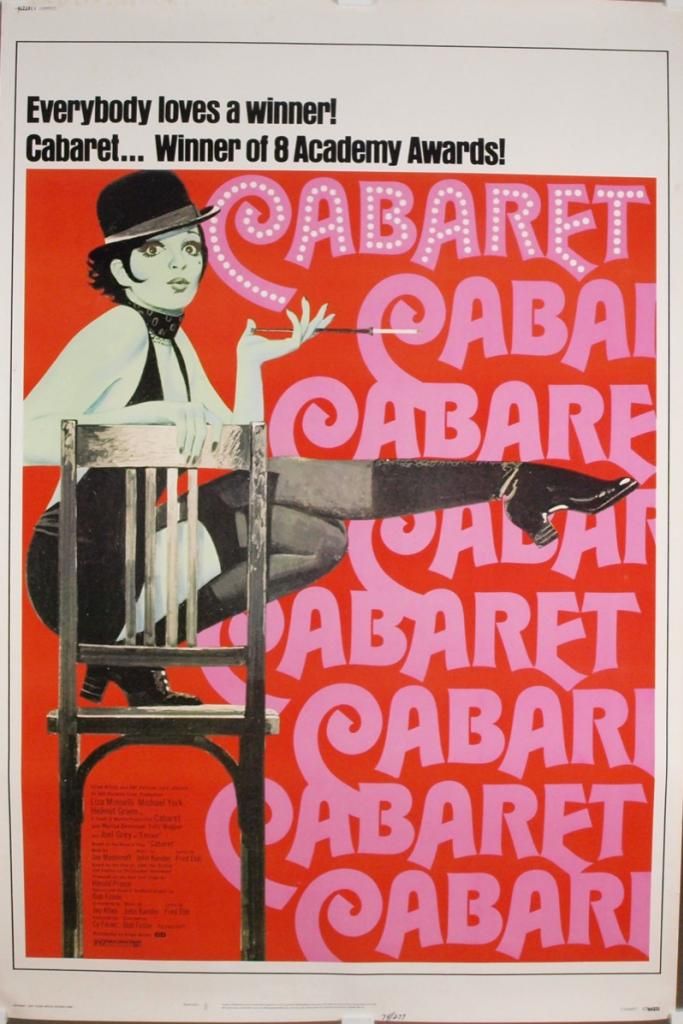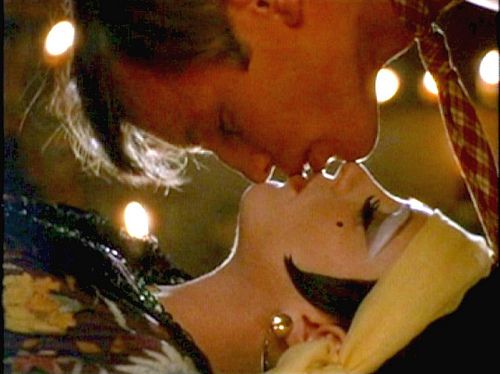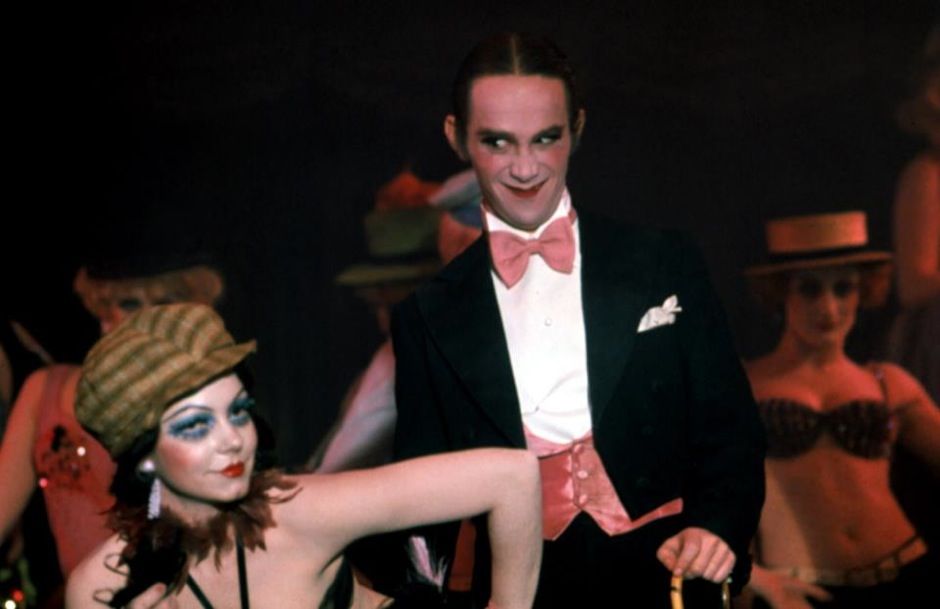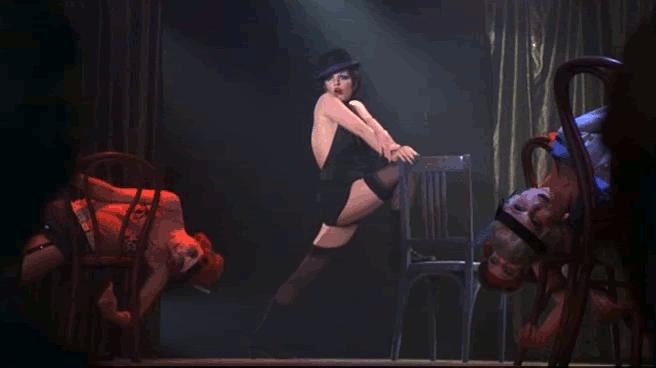Cabaret
1972
Director: Bob Fosse
Starring: Liza Minnelli, Michael York,
Joel Grey, Helmut Griem
Cabaret is all about Sally Bowles and
her divine bohemian goings-on. The
decadence, to the point of grotesquerie, and the sexual infatuations of her
group of cohorts is on full display. To
me, though, the major draw of Cabaret is the intermittent musical
numbers in the divine Fosse style that serve as a Greek Chorus to the plot and
atmosphere of the film.
Sally
(Minnelli in an Oscar-winning performance) is a performer at the Kit Kat Club in
Weimar era 1930s Berlin where the emcee (Grey) oversees all. Buttoned-down Brian (York) arrives and takes
a room in the boarding house where Sally lives.
She’s flighty and ebullient; he’s intrigued. We meet a few friends of theirs through the
boarding house, but the focus is squarely on the odd friendship that develops
between the two. However, when rich and
handsome Maximilian (Griem) enters the picture, the friendship is tested as
jealousies arise.
The
central story about Sally and Brian’s friendship is fairly conventional. Girl meets boy, girl is crazy and theatrical,
boy becomes infatuated with girl, a friendship forms, and things become a
little complicated. When you boil Cabaret
down to its essence, that’s what the film is, a tried and true tale of an
unexpected friendship between two slightly lost souls – but, for me, that’s the
least interesting part of the movie. I
don’t particularly want to boil Cabaret down to its essence, because
then, I’d be missing the best parts.
Before
I go off on those other parts that I like better than the backbone of the tale,
I do want to talk a bit about Brian and Sally.
From a superficial vantage point, it looks as though Sally, with her
crazy green nail polish, her excessive flirtations, and her rather sad attempts
at seductions, is the one who grabs button-down Brian and awakens him, opening
him up to the possibilities of the world at large. But as the movie progresses, I become less
convinced this is the case. I don’t
think Brian was ever button-down at all.
As we slowly learn more about him, he is not nearly as staid and
innocent as he appears, and I hold that their friendship is less about Sally
“teaching” Brian of the world than Sally realizing she was wrong about her
initial impression of him and appreciating him for who he is. Brian really is a bit of a wild-child
underneath all that plaid and all those suits.
Sally didn’t set him free; he was free already. She just thinks she’s setting him free, but
once again, she’s made a mistake about a man.
I
really appreciate how Fosse treated the rise of Nazi power in Cabaret. Despite my love for musicals, I had passed on
watching Cabaret until about four or five years ago when it was playing
on the big screen at the Dryden. I
always thought to myself that I wasn’t particularly interested in watching a
musical about Nazis terrorizing Liza Minnelli.
But that’s not what Cabaret is about. Fosse keeps the Nazis wisely in the background
until the bitter end of the film. He
takes advantage of the fact that every single person who sees Cabaret
knows what happened in World War II, and as such, he merely hints, ever so
slightly at things to come. He doesn’t
need to tell us; we already know. A
great sequence has Brian and Maximilian driving through a street where there
has been a murder. They look on and
comment, but everyone else who is at the scene is stock still. Fosse lingers on the faces and the snapshots
of the crime scene just long enough to remind us there are greater things
happening in Berlin than Sally and Brian.
A subplot of Cabaret involves a love affair between two people whom we learn
are Jewish. When their story reaches its
conclusion, there is no coda to it – which is perfect. Fosse never tells us what became of
them. Did they escape Berlin? Did they stay and probably die? It’s up to the viewer to wonder, and I like
that.
I
can’t go much further without letting everyone know that Cabaret contains one of
my favorite film sequences of all time, one I’ve seen time and time again
thanks to the magic of youtube. The one
song not performed at the Kit Kat Club, “Tomorrow Belongs to Me,” is one of the
most frightening sequences committed to film.
At a quaint restaurant in the idyllic German countryside, Brian and
Maximilian stop for lunch. An adolescent
boy starts singing the song with its lovely little lyrics of rolling hills and
pastoral beauty, but then we see he’s wearing a swastika. As the song continues, it becomes clear that
this is Nazi propaganda at work, convincing the German people that their future
is better and brighter when they entrust it in the hands of the Nazis. Watching nearly every normal, regular German citizen
at that café stand and passionately sing as the song becomes a powerful call to
order sends chills down my spine. In this
one scene, this one frightening yet unassuming little scene, Fosse manages to
delineate precisely how Germany, lost and broken after World War I, could have
thrown itself behind the Nazi party. The
children are singing, the adults are singing, and then that one old man who
refuses to stand – he breaks my heart every time. This is the filmic counterpoint to the
equally powerfully Marseillaise scene from Casablanca. I love both scenes with a passion, but in Casablanca
the singing is for good. In Cabaret,
the singing is in the service of evil.
I’ve only seen Cabaret all the way through twice. I’ve seen “Tomorrow Belongs to Me” more times
than I can count. I find it hauntingly
and frighteningly beautiful.
You have to watch it. It's just so good... and so scary...
Of
course, this is Fosse, so of course, the musical sequences are just
amazing. I already spoke of how
fascinated I am with Fosse’s choreography – all that pelvis, all those ankles,
all those pigeon-toed stances – and “Mein Herr” is probably the best example of
that here. It’s utterly beguiling. I dare you not to get the “Money” song stuck
in your head. I watched this last night,
and woke up this morning with “Money makes the world go around / the world go
around / the world go around” running rampant through my brain. Joel Grey, Broadway legend, is great as the
emcee. His “Two Ladies” number is great
and fun and the reason why Cabaret is
most likely not performed by high schools.
There is a dirty sexualizing of nearly all the musical numbers that is
so fascinating and so Fosse.
I’ve
never seen Cabaret on Broadway, but
if there was one Broadway production I wish I had caught, it was the late 1990s
Cabaret revival starring Natasha
Richardson and Alan Cumming as the emcee.
I’ve seen enough clips on youtube to make it clear that as sexualized as
Fosse’s 1972 Cabaret is, Alan Cumming takes the vulgarity and dials it up to
11. I’m intrigued to see the entire show
– it looks as though the emcee is even more menacing than Grey is here.
As
a whole, I find Cabaret a tad uneven.
The central backbone of the film, as I said earlier, is my least
favorite part of the film - conventional and only moderately engaging for me, but the movie is also filled with terrific musical
numbers in that Fosse style that I utterly adore, and Fosse treats the rise of
Nazi power in an interesting way. It’s
odd, but I’d like to pick and choose what I keep from this film. I wouldn’t trade “Tomorrow Belongs to Me” for
anything, but you can keep Brian and Sally shacking up - and most of the narrative, for that matter.
Arbitrary
Rating: 7.5/10. I’m really torn
here. There are parts I would give an
outright perfect score to, and parts that are just OK. I guess this is a good compromise? Who knows.
Who cares, too – this is just an online movie review. Stop taking it so seriously, Siobhan. ;)




The strange thing about Cabaret is my opinion of Sally. She's a film character that I genuinely dislike, but at the same time I also have a great deal of compassion for her. I really feel bad for what her life becomes.
ReplyDeleteFor my money, though, it's all about Joel Grey. As good as the three actors nominated for The Godfather were and are, and as much as I may like Eddie Albert, there was no contest that year for Best Supporting Actor. This is one of those performances that informs every other person who ever play the part anywhere.
I concur that Joel Grey completely set the bar ludicrously high for everyone else who would ever play the emcee in Cabaret again. Honestly, though, I just wish he was in the film a little bit more. More emcee, less kerfuffle about Brian and Sally.
DeleteI'm remarkably ambivalent about Sally. I'm not crazy annoyed by her, but I don't feel a great deal of compassion either. I'm more interested in the supporting characters, those who orbit around her. Clearly I'm in the minority considering Minnelli won an Oscar for playing Sally. This is probably why I'm not terribly moved by the central story. Oh well.
"The one song not performed at the Kit Kat Club, “Tomorrow Belongs to Me,” is one of the most frightening sequences committed to film."
ReplyDeleteI completely agree. When you realize why he is singing it hits like a hammer. It was this background, but visible, use of the rise of Nazism that makes this film so great. (This was my pick for the Club.) Another little moment I liked was the very end of the song If You Could See Her Through My Eyes. I wasn't expecting that.
I'm with Steve in that I really didn't much care for Sally Bowles. That usually ruins a film for me, but it didn't here.
Ooh, I keep on forgetting about "If You Could See Her Through My Eyes." That's another good one, one of Fosse's little jabs, reminders about what was going on with the Nazis at the time.
DeleteI'm definitely in agreement that the subtle rise of Nazism is a great thing about this movie. I was expecting it to be NAZIS NAZIS NAZIS before I had seen it, and it's just not. Which was refreshing, frankly.
authentic jordans
ReplyDeletehttp://www.raybanglasses.in.net
http://www.cheapauthenticjordans.us.com
longchamp uk
http://www.tiffanyandcojewellery.us.com
cheap mlb jerseys
adidas neo shoes
longchamp bags
http://www.kobebasketballshoes.us.com
jordans for cheap
adidas ultra boost
ReplyDeleteyeezy boost 350 v2
retro jordans
balenciaga
adidas ultra
yeezy boost 350 v2
cheap jordans
kyrie shoes
coach handbags
kyrie 5
kobe
ReplyDeleteyeezy 700
curry 7 sour patch
jordan shoes
yeezy boost 350 v2
kyrie 6
jordans
steph curry shoes
moncler jackets
off white hoodie
duuiixaang985k
ReplyDeletegolden goose outlet
golden goose outlet
golden goose outlet
golden goose outlet
golden goose outlet
golden goose outlet
golden goose outlet
golden goose outlet
golden goose outlet
golden goose outlet